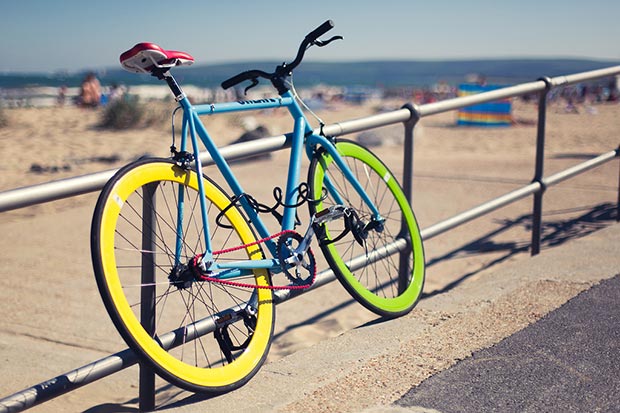In a bustling office in the back of a printer’s shop, David Young and the rest of Poole’s UKIP branch are intent in planning their next campaign events ahead of May’s General Elections. “When I first started I thought it was an interesting challenge, now it’s a real probability,” says Young, a business consultant who 15 years ago decided to move with his family to the town where he would spend his summer holidays as a boy.
How and when did you get involved in politics?
I’ve always been interested in finding solutions to make the world a better place. That’s the reason I studied philosophy and theology at Oxford, and that’s why I chose my business career because, ultimately, the economy is where the rubber hits the road. I was attracted to cooperative experiences, like the John Lewis Partnership or the Mondragon experiment in Spain. It seems to me that we need to develop forms of capitalism that involve the workforce and are more collaborative. I would like to see capitalism harnessed for the benefit of humanity with everybody having their own stake.
Worker cooperatives aren’t exactly what people associate with UKIP.
The left-right dichotomy is unhelpful, especially today. My hope is that UKIP will become a true One Nation party. After all, the late Tony Benn was famously opposed to Britain entering the common market, because he feared for the loss of democracy. That has to be our cornerstone: The people should have a say in what directly affects them. I was quite active with the Conservatives for about ten years, but in time I became increasingly eurosceptic. I am keen on the idea of a common market, but not on subordination to an unaccountable superstate. My concern with the EU is that it is forcing the pace of integration which results in its institutions not being properly democratic.
How would leaving the European Union help the United Kingdom improve its global trade, as UKIP promises in its electoral programme?
We could still benefit from the common market as an EFTA (European Free Trade Association) member like Norway, Switzerland and Iceland which comes with the benefits of free trade without the downfalls of a political union. And other countries such as Japan and Israel compete alone on the global market and they do it quite successfully. It is now clear that “changing Europe from the inside” is impossible. The European Constitution was turned down in various referenda, but it still came from the backdoor as the Lisbon Treaty which now requires unanimity to change the fundamental principles, one of which is the right to freedom of movement. This is why Cameron’s tactic of renegotiation is not going to succeed.
Your party wants to restrict freedom of movement inside the EU, arguing that it’s unfavorable to the UK. But if we look at official figures, the number of European migrants in the UK is almost exactly balanced by the number of Britons living elsewhere in the EU.
It depends on what period you’re looking at. The biggest challenge has come with some of the more recent members of the EU like Bulgaria and Romania.
The biggest influx from those countries has already materialized some years ago.
But it was at the beginning of January that their access rights really clicked in a new way, and I think it’s a bit too soon to judge the effects. We don’t notice it here in the South, I don’t think it’s a big issue for voters in this part of the world. But it is a concern, and parts of the country are suffering from too big of an influx. When the EU was founded you had a group of states whose GDP per capita was roughly comparable, but as we expanded to the East that common ground has been lost. And there is talk of further expanding to include Turkey. This all falls disproportionately heavily on Britain, because English tends to be the second language of those people rather than French, German or Italian.
Isn’t the UK profiting economically from attracting well-educated and multilingual people?
I think there are definitely benefits to migration. I’d say I’m not anti-immigration, but anti-mass uncontrolled immigration. One could argue that our current policy is racist, since it is biased to the predominantly white people who live in Europe and against Africans or Asians whose services we might well want to to introduce. In fact, when I’ve been out campaigning some of the most enthusiastic support I’ve seen has come from black faces. One man, I think from Ghana, told me: “I’m glad UKIP is raising this issue, because as immigrants we feel very much like second class citizens in relation to Europeans.”
What is actually the official UKIP policy on this matter? Earlier this year Farage spoke of a five-year ban on immigration, now he seems to favour the Australian points system. Have you settled on the last one?
The Australian points system is the one we introduced in our last conference.
So, no more five-year ban.
I haven’t heard of a five-year ban, I’ve heard of things like a requirement for people to contribute to the tax system before they’re able to draw on benefits. Our policy proposal is that migrants should only be able to claim benefits, in and out of work, after five years, and be able to apply for permanent residency after 10 years.
Lately your leader has advanced the idea that HIV-positive people should not be allowed to migrate to Britain, do you agree with that comment? Should HIV/AIDS be held as a mark against someone in this day and age?
He was trying to explain how the Australian points system would work, and it’s my understanding that if you want to apply for a visa in Australia you do have to undergo health checks to see if you’re likely to be a liability for the system. The concern expressed by Nigel Farage is an economical one. What he is saying is that there needs to be a debate on the extent on which we’re making available significant medical services to people of other countries, who haven’t contributed to fund the costs of these services. We’ve become a magnet for people who have expensive, difficult to treat, chronic diseases. The drugs for a person with AIDS cost up to 20k per year for life, and that is an extensive financial burden that falls on the population in Britain who are sustaining the NHS.
What do you think are your chances here in Poole?
I am actually very optimistic. When I started I thought it was an interesting challenge, now it is a real probability. Several things have changed in the meantime, starting from the results of the European elections: here in Poole our party polled higher than the national average, roughly 40% with a 10% margin of victory against the Conservatives. There’s a groundswell of feeling for UKIP in this area. Some question the loyalty of these voters in the general elections, but what we’re finding on the doorsteps is that many people are saying: “I first voted UKIP in May, but I’m not going back.” The defections of national MPs have also helped tremendously, and I think there are more to come.
Will this bring forth a mutation, from a more grassroots organisation to a more traditional party?
Not being professional politicians has been part of our strength and appeal, but we’re having to professionalise. The party is growing, now we have MPs, many MEPs, and there is even speculation that we might end up with 125 seats after the next general elections. That is remarkable progress, that was mostly achieved thanks to the work in the last couple of years. Now it is even more likely we will have a hung Parliament, and it is plausible to think that UKIP will hold the balance of power.
A coalition with the Conservatives is a real possibility?
It doesn’t need to be a coalition, it could be a confidence and supply agreement.
Another trading arrangement?
(Laughs) We are wary of political unions. But it could even be with Ed Miliband, Nigel Farage has said he would make a “deal with the devil”, in order to achieve a referendum on Britain leaving the European Union. We also want to make sure we appeal to Labour voters. The most interesting political fact during the last by-elections was how close we came to conquering the Northern Labour stronghold of Heywood and Middleton. So this argument of “go to bed with UKIP and wake up with Miliband” doesn’t hold much ground, and in a number of constituency the opposite is actually true. Here in Poole, for example, it will be a true two horse-race between me and Conservative incumbent Robert Syms.








